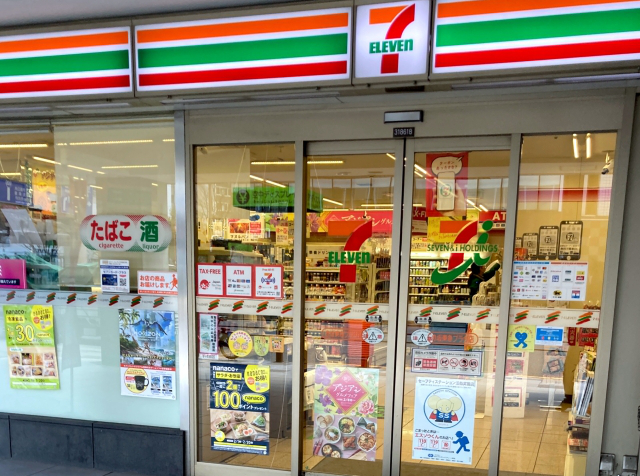
The new containers have already been rolled out at store locations in Japan’s northernmost prefecture Hokkaido.
Japanese convenience store giant 7-Eleven certainly seems to embrace change. From the recently installed floating hologram registers to a simple tactic for extending the shelf life of onigiri rice balls in an effort to reduce food waste, it seems like the chain is always near the front of the pack when it comes to integrating scientific and environmentally conscious practices into its brand.
According to reports, the latest change that 7-Eleven Japan is making is to alter the packaging of certain foods to reduce its carbon footprint. The new white or semi-transparent containers are made from reduced petroleum-based materials that are easy to recycle and will no longer use ink and other coloring agents which release added CO2 during the manufacturing process. The containers for approximately 60 original 7-Eleven fresh foods such as bento boxes, noodle dishes, and side dishes will be converted as part of the switch.
▼ Left image: Depictions of food containers before and after the change / Right image: A sample of a new semi-transparent container for cold soba noodles
セブン、弁当の容器を“無色”にしてCO2排出量削減 https://t.co/clkBPCTGF0 pic.twitter.com/sZGEbaTaaJ
— Impress Watch (@impress_watch) December 13, 2022
In fact, 7-Eleven began implementing the new containers at 997 stores in Hokkaido in early December. Simply by converting the containers sold on the northern island prefecture alone, officials estimate that 40 tons of CO2 emissions will be cut per year.
Net users were somewhat indifferent to the announcement, with a large subset commenting how they wish the chain would first go about eliminating the false bottoms found on many of their food containers instead. In any case, every little step to be more eco-friendly should be celebrated, including 7-Eleven’s convenience store rival Lawson encouraging its customers to use wooden chopsticks instead of plastic forks.
Source: Impress Watch via Otakomu
Top image: SoraNews24
● Want to hear about SoraNews24’s latest articles as soon as they’re published? Follow us on Facebook and Twitter!

 Japan’s newest vending machine absorbs CO2 from the environment
Japan’s newest vending machine absorbs CO2 from the environment 7-Eleven Japan to double the shelf life of their onigiri rice balls
7-Eleven Japan to double the shelf life of their onigiri rice balls Family Mart to celebrate 40th birthday by introducing onigiri with eco-friendly packaging
Family Mart to celebrate 40th birthday by introducing onigiri with eco-friendly packaging 7-Eleven’s new whipped cream sandwich takes Japanese convenience store food to a whole new level
7-Eleven’s new whipped cream sandwich takes Japanese convenience store food to a whole new level Which Japanese convenience store sells the best onigiri rice balls?【Taste test】
Which Japanese convenience store sells the best onigiri rice balls?【Taste test】 Japan’s new difficult-to-drink-from beer glass protects your liver, but it’s a brutal experience
Japan’s new difficult-to-drink-from beer glass protects your liver, but it’s a brutal experience New Pokémon ice cream, dessert drinks, and cool merch coming to Baskin-Robbins Japan【Pics】
New Pokémon ice cream, dessert drinks, and cool merch coming to Baskin-Robbins Japan【Pics】 New samurai glasses are Japan’s latest weird must-have souvenir
New samurai glasses are Japan’s latest weird must-have souvenir Come play hide-and-seek on a deserted Japanese island this August and November
Come play hide-and-seek on a deserted Japanese island this August and November Nintendo history you can feel – Super NES, N64, and GameCube controllers become capsule toys
Nintendo history you can feel – Super NES, N64, and GameCube controllers become capsule toys Demon Slayer: Kimetsu no Yaiba gets new roller coaster attractions and food at Universal Studios Japan
Demon Slayer: Kimetsu no Yaiba gets new roller coaster attractions and food at Universal Studios Japan Doraemon found buried at sea as scene from 1993 anime becomes real life【Photos】
Doraemon found buried at sea as scene from 1993 anime becomes real life【Photos】 Infographic shows how working culture differs across the globe
Infographic shows how working culture differs across the globe Hello, cosmetics! Clinique teams up with Hello Kitty this summer for first-time collaboration
Hello, cosmetics! Clinique teams up with Hello Kitty this summer for first-time collaboration Japan’s new canned chu-hai with fresh lemon slice: disappointing gimmick or drink revelation?
Japan’s new canned chu-hai with fresh lemon slice: disappointing gimmick or drink revelation? “The most Delicious Cup Noodle in history” – Japan’s French Cup Noodle wins our heart【Taste test】
“The most Delicious Cup Noodle in history” – Japan’s French Cup Noodle wins our heart【Taste test】 Starbucks releases a cute Frappuccino and Unicorn Cake…but not in Japan
Starbucks releases a cute Frappuccino and Unicorn Cake…but not in Japan Kyoto Tower mascot termination reveals dark side behind cute Japanese characters
Kyoto Tower mascot termination reveals dark side behind cute Japanese characters McDonald’s Japan’s Soft Twist Tower: A phantom ice cream only sold at select branches
McDonald’s Japan’s Soft Twist Tower: A phantom ice cream only sold at select branches Yabai Ramen: What makes this Japanese ramen so dangerous?
Yabai Ramen: What makes this Japanese ramen so dangerous? Finally! Nintendo Japan expands Switch 8-bit controller sales to everybody, Online member or not
Finally! Nintendo Japan expands Switch 8-bit controller sales to everybody, Online member or not Japanese government wants to build luxury resorts in all national parks for foreign tourists
Japanese government wants to build luxury resorts in all national parks for foreign tourists To combat declining birth rate, Japan to begin offering “Breeding Visas” to foreigners
To combat declining birth rate, Japan to begin offering “Breeding Visas” to foreigners 10 things you should buy at 7-Eleven in Japan
10 things you should buy at 7-Eleven in Japan Studio Ghibli releases anime heroine cosplay dresses that are super comfy to wear
Studio Ghibli releases anime heroine cosplay dresses that are super comfy to wear Woman charged for driving suitcase without a license in Osaka
Woman charged for driving suitcase without a license in Osaka Studio Ghibli unveils My Neighbour Totoro miniature house model
Studio Ghibli unveils My Neighbour Totoro miniature house model Kyoto experiencing problems with foreign tourists not paying for bus fares, but not on purpose
Kyoto experiencing problems with foreign tourists not paying for bus fares, but not on purpose Fighting mild hunger with a Japanese soda that turns into jelly in the stomach【Taste test】
Fighting mild hunger with a Japanese soda that turns into jelly in the stomach【Taste test】 Studio Ghibli’s Howl’s Moving Castle tapestry unveiled in Japan for first time
Studio Ghibli’s Howl’s Moving Castle tapestry unveiled in Japan for first time McDonald’s new Happy Meals offer up cute and practical Sanrio lifestyle goods
McDonald’s new Happy Meals offer up cute and practical Sanrio lifestyle goods Sales of Japan’s most convenient train ticket/shopping payment cards suspended indefinitely
Sales of Japan’s most convenient train ticket/shopping payment cards suspended indefinitely Sold-out Studio Ghibli desktop humidifiers are back so Totoro can help you through the dry season
Sold-out Studio Ghibli desktop humidifiers are back so Totoro can help you through the dry season Japanese government to make first change to romanization spelling rules since the 1950s
Japanese government to make first change to romanization spelling rules since the 1950s Foreigner’s request for help in Tokyo makes us sad for the state of society
Foreigner’s request for help in Tokyo makes us sad for the state of society Ghibli founders Toshio Suzuki and Hayao Miyazaki contribute to Japanese whisky Totoro label design
Ghibli founders Toshio Suzuki and Hayao Miyazaki contribute to Japanese whisky Totoro label design Tokyo’s most famous Starbucks is closed
Tokyo’s most famous Starbucks is closed Princesses, fruits, and blacksmiths: Study reveals the 30 most unusual family names in Japan
Princesses, fruits, and blacksmiths: Study reveals the 30 most unusual family names in Japan Starbucks teams up with Japanese shochu brewery for a whole new coffee experience
Starbucks teams up with Japanese shochu brewery for a whole new coffee experience Synthetic fossil fuels made from light, water, and CO2 in the air tested in Osaka
Synthetic fossil fuels made from light, water, and CO2 in the air tested in Osaka 7-Eleven Japan now has plant-based vegetarian steamed “meat buns”
7-Eleven Japan now has plant-based vegetarian steamed “meat buns” Japanese convenience store ice cream solves plastic-vs.-wooden-spoon dilemma with edible spoons
Japanese convenience store ice cream solves plastic-vs.-wooden-spoon dilemma with edible spoons Japanese pantyhose commercial quiz asks viewers to pick out the sole woman in stockings 【Video】
Japanese pantyhose commercial quiz asks viewers to pick out the sole woman in stockings 【Video】 Are high-end convenience store rice balls really packed with more ingredients?
Are high-end convenience store rice balls really packed with more ingredients? This 7-Eleven convenience store causes a buzz with foreigners online
This 7-Eleven convenience store causes a buzz with foreigners online Retailer Muji converts all plastic beverage bottles into aluminum cans
Retailer Muji converts all plastic beverage bottles into aluminum cans 7-Eleven escalates anime goody arms race with gigantic Evangelion statue that could be yours
7-Eleven escalates anime goody arms race with gigantic Evangelion statue that could be yours Attack on Titan rice ball is as titanic as the Japanese anime
Attack on Titan rice ball is as titanic as the Japanese anime How to turn konbini food into a luxury Japanese meal
How to turn konbini food into a luxury Japanese meal No more plastic cups — Starbucks Japan aims to get rid of plastic in stores with new initiatives
No more plastic cups — Starbucks Japan aims to get rid of plastic in stores with new initiatives 97 percent of Kumamoto convenience stores open for business just three days after major quakes
97 percent of Kumamoto convenience stores open for business just three days after major quakes Which Japanese convenience store has the best plain onigiri rice balls?
Which Japanese convenience store has the best plain onigiri rice balls? Grab a clear sparkling drink from Starbucks at a convenience store in Japan and get refreshed!
Grab a clear sparkling drink from Starbucks at a convenience store in Japan and get refreshed! Floating hologram registers coming to Japanese convenience stores【Video】
Floating hologram registers coming to Japanese convenience stores【Video】 10 things you should buy at 7-Eleven in Japan
10 things you should buy at 7-Eleven in Japan
Leave a Reply